conlang enjoyer language lover undisciplined argh ml: 🇩🇪B2/C1: 🇬🇧B1:🇫🇷🇪🇸 (both dormant)currently learning: 🇵🇱want to learn: 🇫🇮🇳🇱
Don't wanna be here? Send us removal request.
Text
i love and hate that everytime i start thinking about conlanging too intensely, it turns into questions about philosophy
#WHAT is a word#what things should be words?!?!?#which concepts would be so integral to a society I HAVENT EVEN CONJURED UP IN MY MIND YET to be separate words???#conlanging
5 notes
·
View notes
Note
hello, i want to try conlanging but i have no idea where to start, and i was wondering if you have any tips/advice?
thank you in advance :D
You know what, I got something that may just be the thing for you:
Go to Jessie Peterson's Conlang Year, go to Day 1, and just work through it day by day. It will give you daily prompts to work on so that you know what information you need to research when. Work through it at your own pace and you should have a conlang at the end!
194 notes
·
View notes
Text
Mleko (milk) is my favorite word so far. Reminds me of a cat mlem 👅
23 notes
·
View notes
Text
Polish pronunciation tips
Pronouncing trzy (three):
If you're struggling with this, it may be because you're trying to say it like t-rzy, when really it is said t-szy. This is because putting an unvoiced consonant before a voiced one causes devoicing, so the consonant cluster becomes unvoiced. If you don't know what voicing in consonants is:
So a word such as żabka ("froggie", also the name of a major retailer) is said like żapka. Another thing to note is that the t in trzy must be pronounced distinctly and not said as if the word is czy (if, or, question marker).
Ę and ą - why do they sometimes sound like e and o?
A development in the Polish language is the loss of nasalization on ę and ą, particularly at the ends of words. This isn't universal across Poland, but it will be common enough that you should know it.
Ę and ą are nasalized except for when at the end of words. So mężczyzna (man) is said menżczyzna but piję (I drink) is pronounced like pije. Likewise, skąd (from where) is said skond but piją (they drink) like pijo.
33 notes
·
View notes
Text
It’s messed up English language doesn’t have a perfect equivalent of the polish word już. It translates to already, or now, or yet, depending on context; it’s a word to signal that I’m doing it, get off my ass: już wstaję means I’m getting up, but also can you kindly fuck off. Już idę means I'm coming, stop badgering me.
już, już is used to soothe, like there there (or british now, now!), but it's so much richer in meaning.
Już?! is an exclamation of surprise, already? or right now?!
These words always make me think how nature of language reflects the nature of people that use it; it's so normal for polish people to wait for shit, to go slow about business. Not nearly as slow as the southerners, mind you, but I’d say we are chill compared to Western Europe
23 notes
·
View notes
Text
cześć! little update on this blog!
i’ve started learning polish, semi seriously before starting an actual polish course for beginners in october. i’m so excited!!!
and starting in october, i’ll be studying empirical linguistics and aaarrggh i can’t wait!!! it still feels like an eternity until the semester starts. anyways, my blog will probably become a bit more active once the semester starts ^^.
na razie!
1 note
·
View note
Note
Hi! I want to learn French and Russian. Could you share your favourite resources for beginners? Could you also include books and movies/TV shows recommendations for both languages in your post? Thank you.
That's really cool that you want to learn those languages!!!
I have a bunch of Russian resources that I used because I started out as solely self-learning. So a large part in my absolute beginner phase I spent listening to podcasts, specifically, these: understanding spoken Russian which is great for just getting a feel for the language while also learning a bit of grammar and this one for getting grammar and vocab explained in a very down to earth kind of way without any types of big words you need to know.
Besides these I essentially learned all the Russian grammar I know on Youtube. Especially from this channel. Daria is very cool and also has several podcasts under the same name.
This one has helped me with specific questions about little grammar things, so might also be useful.
Nastya has this year begun doing a Learn Russian in a Year thing where she uploads every day a thirty minute lesson. It's a bit slow for me personally having already learned a lot and just generally me being impatient but it can definitely help with vocab.
He also has good videos and also some free stuff on his website iirc.
For TV shows I unfortunately can't recommend a lot for beginners. What you can do though is watch episodes like Peppa the Pig on Youtube in English and in Russian/French to compare and learn or only in your TL as they're obviously at a low level. What I do highly recommend as a show though is слуга народу for Russian and Lupin for French.
Also, if you're into audiobooks, try typing children audiobooks into Youtube or try listening to the Russian/French version of Harry Potter (that's what I'm doing rn actually).
If you're looking for a book and willing to spend some money I recommend this book with Russian short fiction for beginners. I just finished it and I thought it was very fun with vocab lists and questions for the stories at the end. The same author has also books for higher levels.
Unfortunately, as I learned almost all of French in classes I only have one channel I actually use to recommend, which is this one. You'll find some of my posts where I used this channel as my source.
I hope this helps! I might update in future when I find more. Good luck with your language learning journey!!
472 notes
·
View notes
Text
How to build a language self-study plan

So I’ve noticed, upon combing through pages and pages of youtube videos and google blogs, that rarely does anyone ever actually tell you what you should be studying. There’s a reason for this ! Everyone is different and at a different level, different motivation. It’s impossible to create a study plan that is perfect for everyone… which is why it can also be agonizing to make one for yourself.
“How am I supposed to know what’s important to study, if I don’t speak the language?”
Well that’s a good question! You need to gauge how far you’ve come so far and how far you’d like to get. It’s easiest when you are starting from zero because you can learn the alphabet, numbers, basic phrases, and basic grammar. Easy peasy. You can go cover to cover in a text book.
Here’s a check-list to create the perfect study plan special to you.
1. What do I know already? What do I need to work on?
- is it worth starting a textbook, if you feel like you already know half of it? It might be worth completing the given exercises and if you achieve an 80% or higher (or you could give that lesson to someone else) then you can move on from that specific point.
- create a list of the points that you still need to master
2. What do I need to include in a study session?
- naturally there needs to be a focus or a few different focuses of a study session, whether it’s a specific activity or a grammar point. I recommend creating a list of things you want to get done (a.) every day, (b) every week, and © every month. These goals must be quantifiable. For example, every week I read two news articles in German. As a reflection, I then write a summary of the event of the article as well as a personal opinion. That’s an easy box to check.
- you need a reflection. It’s important to really take time to reflect on how you feel about the time spent and the materials used. What could you do better next time? What went well?
3. When is the best time to study?
- are you more active/focused in the morning or in the night? The key is consistency. If you have a routine, you’re far more likely to adhere to it. I know that my own schedule is highly changeable and that can make it very difficult, but I’ve found if I wake up in the same period of time every morning, brush my teeth, make my bed, and then sit down to my work, I feel far more productive.
- how much should I study at a time? The recommended period is 25 minutes from the Pomodoro Method with a five minute break. You can research time-management techniques but ultimately it comes down to you.
4. How do I take notes ?
- IT”S ALL ABOUT YOU! What I do is take messy notes in classes or on my own and then I transcribe the finished page to my Notion page. It gives me a chance to make the notes neater and also to review a little bit. I will say though statistically, you will remember better if you write by hand.
- I like to have a column on each page for words I didn’t know
2K notes
·
View notes
Text
does anyone have any recommendations for beginner level finnish textbooks? There are so many out there and im not sure which one to choose :’)
20 notes
·
View notes
Text
Useful links to Learn Finnish
~ Learning resources ~
# Apps #
Duolingo, a classic, it teaches you vocabulary and basic sentence structure
Drops, a great app to learn vocabulary, and it’s organized by subjects
Clozemaster, makes you fill sentences, slightly advanced
Memrise, good to learn vocabulary, includes textbooks vocabulary too
Mondly, teaches vocabulary and basic sentence structure
WordDive, seems like a comprehensive course (I haven’t tested this one)
# Textbooks #
Suomen Mestari, the book most Finnish classes use, is in Finnish only
Oma Suomi, a book for self-learning English speakers
# Websites #
The Finnish Teacher, easily approachable grammar lessons
Verbix, to find verb conjugations
Sanakirja, very complete dictionary and translator
Urbaani sanakirja, Finnish equivalent to Urban dictionnary
Uusi kielemme, a good vocabulary list divided by themes and levels
Finnish swear words on Wikipedia, essential!
# Video & audio lessons #
Finnish Pod, numerous audio and video lessons
Supisuomea-videot by Yle, videos with simple Finnish and subtitles
FSI courses, recordings of conversational Finnish
# Complete beginner resources #
A Taste of Finnish, reading, listening and grammar points
Kielet by Yle, lessons in Finnish with videos
Venla, for vocabulary, structures and grammar
Digital Dialects, games to learn Finnish
~ Listening resources ~
# Podcasts #
Opi Suomea!, a podcast in simple Finnish
Yle uutiset selkosuomeksi, a news podcast in easy Finnish
Auta Antti!, a podcast where the host answers listeners questions
# Music & Radio #
Radio Suomi Pop, only Finnish songs & Finnish speakers
Tunein, to access more Finnish radios
#vainsuomihitit, Spotify playlist with all the new Finnish hits
Suomen musiikki, my Finnish spotify playlist
Mirka Karoliina, Disney songs with Finnish subtitles and translations
# Movies & TV shows #
My Finnish movies masterlist (needs to be updated)
Yle Arena, legal streaming of Finnish shows & others with Finnish subtitles
Some American streaming services (Netflix, Disney+ etc) have things dubbed in Finnish (mostly cartoons and kid’s shows), but most of those are only available if you’re in Finland (or use a VPN)
# Youtubers #
Papananaama
KAKSI ÄITIÄ
maiju
~ Reading & Writing resources ~
# Reading #
Yle uutiset selkosuomeksi, news articles in easy Finnish
Oppiminen by Yle, various articles in easy Finnish
Free Finnish books, for advanced level
# Writing #
LangCorrect, write diary entries and get corrected by native Finnish speakers
~ Communities ~
# Finnblrs #
Tags on Tumblr: Finnish / Finnish langblr / Finnblr / Finnish language
This is Finnish
Suomen Kieli
Fennophile
Tealingual
Finn in training (mine)
# Others #
LearnFinnish on Reddit
Static page version of this post can be found here. Older versions of this article can be found here and here.
371 notes
·
View notes
Text
cool new language resource i just discovered: lingotrack! it functions somewhat like polylogger, allowing you to log your activity for languages, but, more than that, it has an explore section where you can find media that's in a particular language, such as books, tv shows, films, etc! one of the hardest things when you reach a more proficient level of a language is finding media in that language to engage with, so i think this is probably a good resource, or at least a place to get started. besides the explore function, there's also collections of media/resources, and a library function where you can add your own resources. it does require you to have a paid account to log study time for multiple languages (the free version allows you one primary language), but the other aspects seem to be available to free users in their entirety!
2K notes
·
View notes
Photo
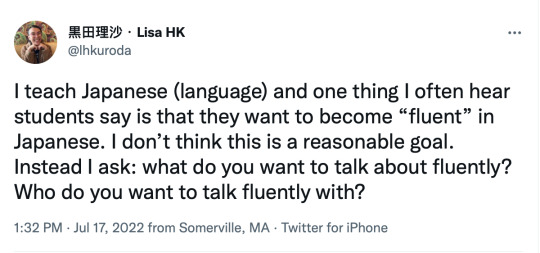
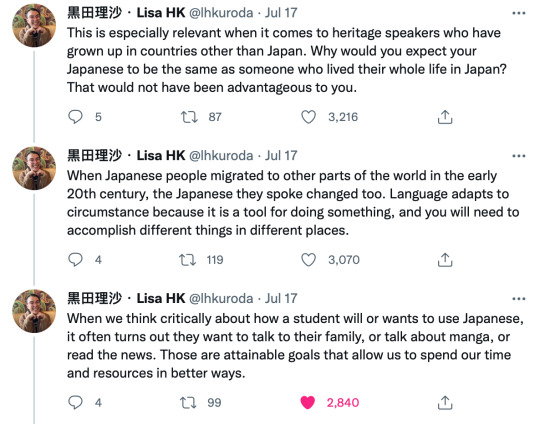
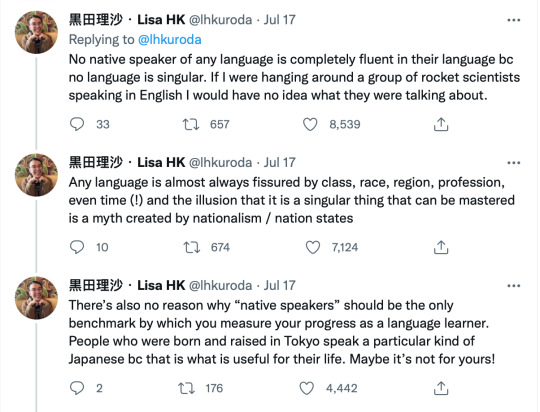
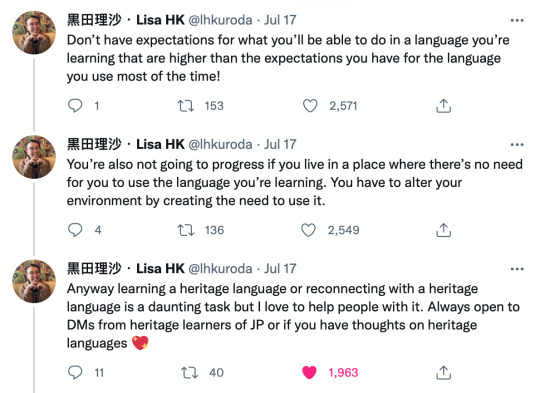
This Twitter thread really spoke to me. I wanted to share it with anyone who hasn’t seen it.
38K notes
·
View notes
Text
Best language learning tips & masterlists from other bloggers I’ve come across
(these posts are not my own!)
THE HOLY GRAIL of language learning (-> seriously tho, this is the BEST thing I’ve ever come across)
Tips:
Some language learning exercises and tips
20 Favorite Language Learning Tips
what should you be reading to maximize your language learning?
tips for learning a language (things i wish i knew before i started)
language learning and langblr tips
Tips on how to read in your target language for longer periods of time
Tips and inspiration from Fluent in 3 months by Benny Lewis
Tips for learning a sign language
Tips for relearning your second first language
How to:
how to self teach a new language
learning a language: how to
learning languages and how to make it fun
how to study languages
how to practice speaking in a foreign language
how to learn a language when you don’t know where to start
how to make a schedule for language learning
How to keep track of learning more than one language at the same time
Masterposts:
Language Study Master Post
Swedish Resources Masterpost
French Resouces Masterpost
Italian Resources Masterpost
Resource List for Learning German
Challenges:
Language-Sanctuary Langblr Challenge
language learning checkerboard challenge
Word lists:
2+ months of language learning prompts
list of words you need to know in your target language, in 3 levels
Other stuff:
bullet journal dedicated to language learning
over 400 language related youtube channels in 50+ languages
TED talks about language (learning)
Learning the Alien Languages of Star Trek
.
Feel free to reblog and add your own lists / masterlists!
17K notes
·
View notes
Text
Duolingo Sucks, Now What?: A Guide
Now that the quality of Duolingo has fallen (even more) due to AI and people are more willing to make the jump here are just some alternative apps and what languages they have:
"I just want an identical experience to DL"
Busuu (Languages: Spanish, Japanese, French, English, German, Dutch, Italian, Portuguese, Chinese, Polish, Turkish, Russian, Arabic, Korean)
"I want a good audio-based app"
Language Transfer (Languages: French, Swahili, Italian, Greek, German, Turkish, Arabic, Spanish, English for Spanish Speakers)
"I want a good audio-based app and money's no object"
Pimsleur (Literally so many languages)
Glossika (Also a lot of languages, but minority languages are free)
*anecdote: I borrowed my brother's Japanese Pimsleur CD as a kid and I still remember how to say the weather is nice over a decade later. You can find the CDs at libraries and "other" places I'm sure.
"I have a pretty neat library card"
Mango (Languages: So many and the endangered/Indigenous courses are free even if you don't have a library that has a partnership with Mango)
Transparent Language: (Languages: THE MOST! Also the one that has the widest variety of African languages! Perhaps the most diverse in ESL and learning a foreign language not in English)
"I want SRS flashcards and have an android"
AnkiDroid: (Theoretically all languages, pre-made decks can be found easily)
"I want SRS flashcards and I have an iphone"
AnkiApp: It's almost as good as AnkiDroid and free compared to the official Anki app for iphone
"I don't mind ads and just want to learn Korean"
lingory
"I want an app made for Mandarin that's BETTER than DL and has multiple languages to learn Mandarin in"
ChineseSkill (You can use their older version of the course for free)
"I don't like any of these apps you mentioned already, give me one more"
Bunpo: (Languages: Japanese, Spanish, French, German, Korean, and Mandarin)
87K notes
·
View notes
Text
aaarrgghhh im having so many problems trying to learn the IPA... i feel like i dont have enough control over my mouth to reach half of those places?? and when i listen to recordings of some sounds i just dont hear the differences... its so frustrating. i feel like it will never make sense to me :(
#personal#linguistics journey#ive been putting off learning the IPA for so long but now that im getting into conlangs i should really get to it
2 notes
·
View notes
Photo
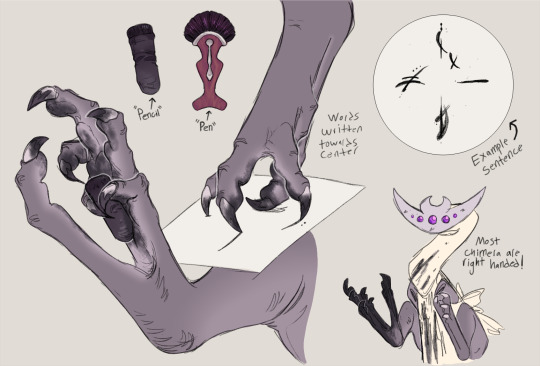
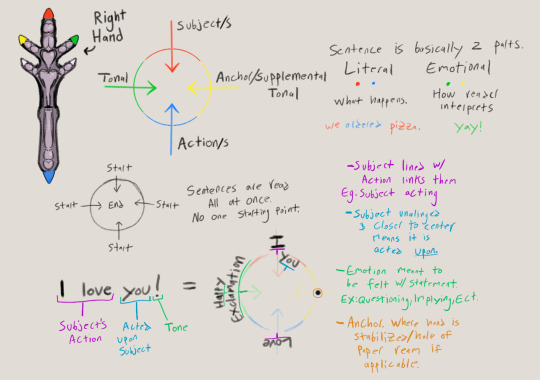
Wanted to figure out how chimera’s wrote and ended up starting on their written language proper. MASSIVE info dump below!
Keep reading
2K notes
·
View notes
Text
I NEED TO READ I NEED TO WRITE I NEED TO CREATE I NEED TO DRAW I NEED TO CLEAN I NEED TO WORK OUT I NEED TO LEARN *watches YouTube for 6 hours*
113K notes
·
View notes